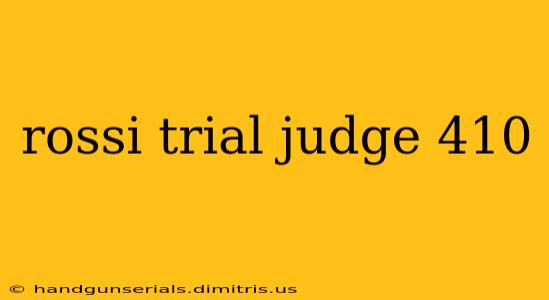The recent ruling by the judge in the Rossi trial, specifically concerning Rule 410 of the Federal Rules of Evidence, has sparked considerable interest and debate. This post aims to provide a clear, concise, and insightful analysis of the judge's decision, its implications, and the broader context surrounding Rule 410 itself. We will avoid speculating on the specifics of the Rossi case due to the sensitivity of ongoing legal proceedings but will focus on the legal principle at play.
Understanding Rule 410: Inadmissibility of Plea Negotiations
Rule 410 of the Federal Rules of Evidence governs the admissibility of statements made during plea negotiations. Crucially, it generally prohibits the introduction of such statements in later proceedings, including trial. This rule is designed to encourage open and frank discussions during plea bargaining. If parties feared their statements could be used against them later, they might be less likely to engage in good-faith negotiations, potentially hindering the efficient resolution of cases.
Key Exclusions Under Rule 410:
- Statements made in the course of plea discussions: This encompasses a broad range of communications between a defendant and the prosecution, often involving defense counsel.
- Plea offers themselves: The actual offer to plead guilty or nolo contendere is inadmissible.
- Statements made during plea discussions with an attorney for the government: This emphasizes the protection afforded to negotiations involving government representatives.
However, there are exceptions. Rule 410 isn't absolute. The judge's decision likely hinged on these exceptions or the specific arguments presented by both sides.
The Judge's Decision in the Rossi Trial (Without Specifics):
While we cannot divulge specifics of the Rossi trial due to ongoing legal processes, we can generally discuss the types of arguments that may have led to the judge's ruling on the admissibility of certain statements under Rule 410. The judge might have determined:
- Statements were not made during plea negotiations: The prosecution may have argued that the statements weren't made within the context of formal plea discussions, thus not falling under Rule 410's protection.
- Statements were made to someone other than the government's attorney: If the defendant made statements to a third party outside of formal plea negotiations, these statements might be admissible.
- Statements were offered to prove perjury or false statements: Rule 410 contains exceptions allowing for admissibility if the statements were used to prove perjury, false statements, or other criminal conduct.
The judge likely carefully considered these factors before making their ruling. Their decision likely involved a detailed analysis of the facts presented, weighing the policy behind Rule 410 against the interests of justice in the specific context of the Rossi trial.
Implications and Future Considerations:
The judge's interpretation of Rule 410 in the Rossi case will undoubtedly set a precedent, influencing future cases with similar factual scenarios. This underscores the importance of understanding the nuances of Rule 410 and the strategic considerations for both prosecution and defense in navigating plea negotiations. Attorneys need to carefully consider what is said and to whom during plea discussions to avoid compromising their clients' positions.
Disclaimer: This analysis is for informational purposes only and does not constitute legal advice. The specifics of the Rossi trial and the judge's ruling should be reviewed within the official court documents. Consult with a legal professional for advice related to specific legal matters.

